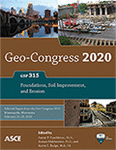Geo-Congress 2020
Cement Suspension Flow through Heterogeneous Porous Media
Publication: Geo-Congress 2020: Foundations, Soil Improvement, and Erosion (GSP 315)
ABSTRACT
Cement permeation grouting is a soil improvement method applied to increase the strength of a soil body and/or lower its hydraulic conductivity. This method is particularly useful in cases where surface access is limited and where soil disturbance cannot be tolerated, for example when improving soil below an existing structure. Cement permeation grouting has been extensively studied and our understanding of the mechanisms controlling its successful application has improved remarkably over the past decades. However, most of the performed studies consider homogeneous porous media, and understanding the effect of soil heterogeneity on grout propagation is still lacking. In fact, soil heterogeneity is often considered a limitation when trying to apply lab test results to field applications. This paper introduces a 2D grouting setup to research grouting of heterogeneous layered soils. The paper presents preliminary test results demonstrating the effect of soil heterogeneity on grout flow compared to flow in homogenous soils.
Get full access to this article
View all available purchase options and get full access to this chapter.
ACKNOWLEDGMENT
This work was supported by the National Science Foundation, Geomechanics and Geomaterials program and Geotechnical engineering program, under Grant No. 1254763. This support is gratefully acknowledged.
REFERENCES
Christodoulou, D. N., Markou, I. N., & Papadopoulos, B. K. (2014). Penetrability of microfine cement grouts: Experimental investigation and fuzzy regression modeling. Canadian Geotechnical Journal, 52(7), 868-882.
Dano, C, Hilcher, PY, Tailliez, S, (2004). Engineering properties of grouted sands, Journal of Geotechnical Geoenviromental Engineering, 130(1), 328–338.
Dwyer, B.P. (1994). Feasibility of permeation grouting for constructing subsurface barriers (SAND--94-0786). United States.
El Mohtar, C.S., Brady, J., Sangroya, R., Jaffal, H., Kwan, W.S., Miller, A.K. (2016). Using laboratory testing for designing an optimum field grout for the Millwoods Double Barrel Replacement project. Proceedings of the World Tunneling Congress, San Francisco.
ElMohtar, C.S., Yoon, J., Sangroya, R., and Jaffal, H. (2017). Transferring innovative research into practical wisdom: the case of permeation grouting. Innovative Infrastructure Solutions, Vol. 37, Issue 2.
Hashimoto, K., Nishihara, S., Oji, S., Kanazawa, T., Nishie, S., Seko, I., Hyodo, T., Tsukamoto, Y., (2016). Field testing of permeation grouting using microfine cement. Proceedings of the Institution of Civil Engineers. Ground Improvement, Volume 169(2), Pages 134-142, ISSN.
Henn, R. W., & Soule, N. C. (2010). Ultrafine cement in pressure grouting. Reston, Va: American Society of Civil Engineers.
Jaffal, H., Sangroya, R., El Mohtar, C.S., (2017). A Laboratory Investigation into Time-Pressure Curves for Stable versus Unstable Grouts. Proceedings of the Grouting 2017: Jet Grouting Deep Mixing and Diaphragm Walls Conference, Honolulu, Hawaii, GSP 288 pp.290-300.
Mollamahmutoğlu, M., & Avci, E. (2014). Ultrafine portland cement grouting performance with or without additives. KSCE Journal of Civil Engineering, 19(7), 2041-2050.
Mollamahmutoğlu, M., & Avci, E. (2015). Effectiveness of microfine portland cement grouting on the strength and permeability of medium to fine sands. Periodica Polytechnica. Civil Engineering, 59(3), 319-326.
Pantazopoulos, I.A., Markou, I.N., Christodoulou, D.N. (2012). Development of microfine cement grouts by pulverizing ordinary cements, Cem. Concr. Compos. 34(5), 593–603.
Schwarz, LG, Chirumalla, M. (2007). Effect of injection pressure on permeability and strength of microfine cement grouted sand. Grouting for ground improvement: innovative concepts and applications. Geo-Denver. ASCE Geotech SP 168.
Warner, J. (2004). Practical Handbook of Grouting. John Wiley & Sons, NJ, USA.
Information & Authors
Information
Published In
Geo-Congress 2020: Foundations, Soil Improvement, and Erosion (GSP 315)
Pages: 695 - 704
Editors: James P. Hambleton, Ph.D., Northwestern University, Roman Makhnenko, Ph.D., University of Illinois at Urbana-Champaign, and Aaron S. Budge, Ph.D., Minnesota State University, Mankato
ISBN (Online): 978-0-7844-8278-0
Copyright
© 2020 American Society of Civil Engineers.
History
Published online: Feb 21, 2020
ASCE Technical Topics:
- Cement
- Chemical properties
- Chemistry
- Concrete
- Construction engineering
- Construction methods
- Engineering materials (by type)
- Environmental engineering
- Flow (fluid dynamics)
- Fluid dynamics
- Fluid mechanics
- Geomechanics
- Geotechnical engineering
- Grouting
- Heterogeneity
- Hydrologic engineering
- Materials engineering
- Porous media flow
- Soil cement
- Soil dynamics
- Soil grouting
- Soil mechanics
- Soil properties
- Soil stabilization
- Soil strength
- Water and water resources
Authors
Metrics & Citations
Metrics
Citations
Download citation
If you have the appropriate software installed, you can download article citation data to the citation manager of your choice. Simply select your manager software from the list below and click Download.
